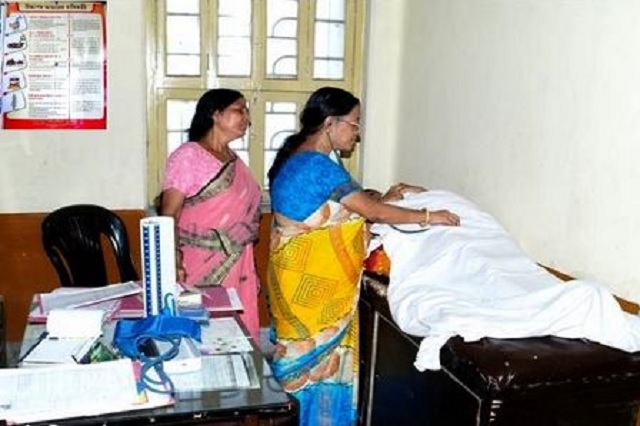Healthcare
TOLLYGUNGE WOMEN IN NEEDHealthcare
In Healthcare, in addition to running regular medical clinics, initiatives are in place to promote the implementation of the following medical programmes among the beneficiaries across all three projects:



Free Medical Clinic
As a part of TWIN’s community service, the Tollygunge centre facilitates a free for service weekly medical clinic for TWIN’s beneficiaries, their families and the underprivileged community in the neighbourhood. They are offered free medical consultation and free essential medicines for diabetes, blood pressure, cold & cough, fever, etc.
Immunization
Immunization is a way of protecting against serious diseases. Once we have been immunized, our bodies are better able to fight those diseases if we come into contact with them. Initially, the NGO took the initiative to vaccinate all its children with the WHO-recommended vaccines as well as booster doses to protect the children from preventable diseases. Now, the universal vaccination is a Government programme. The NGO however, monitors that its children are indeed receiving the desired vaccinations, including the booster doses in time.
Pulse Polio
Pulse Polio Vaccination is a Government programme for the children up to the age of 5 years. In this programme, children are given polio vaccines periodically to eradicate polio and thereby achieve full eradication of the disease from our country. This spreads awareness among the families associated with us and encourages them to get their children’s desired polio doses regularly.
Eye Check-up & Provision for Spectacles
“Better Vision” programme of GKB Opticals, helps TWIN in organizing eye check-up camps in its project areas. In these camps, men, women and children of all age groups undergo check-ups of their vision for free. Those with impaired vision due to myopia, astigmatism or long-sightedness are provided with free-of-cost spectacles by GKB Opticals. Those with clinical eye ailments are referred to an Eye Specialist.
Pre and Post Natal (PPN) Programme
The PPN programme of TWIN, started in 1998, is designed to improve the state of health of women and their children. The program is based on the fact that ‘healthy mothers give birth to healthy children’. The programme follows two of the UN’s Millennium Development Goals, viz. improve (i) Infant Mortality Rate (IMR) and (ii) Mother Mortality Rate (MMR).
The PPN programme has improved the health status of women and children and reduced IMR and MMR by addressing the main causes of morbidity & mortality. The safe motherhood component of the programme was implemented through regular gynaecological check-ups, vaccination, nutritional diet and medicine supplements during pregnancy and lactating period. In the ‘child survival’ component, breastfeeding and immunization have been receiving the maximum attention
Cervical Screening - Importance of Cervical Screening
- Cervical cancer is the second most common cancer among women worldwide and is most common among women living in developing countries.
- The cancer of the uterine cervix is due to HPV (Human Papilloma Virus) infection and is compounded by other factors such as poor genital hygiene (among both women and their partners), frequent deliveries, use of tobacco etc.
- The cervical cells do not suddenly change into cancer. The normal cells of the cervix first develop pre-cancerous changes that gradually transform into invasive cancer. The pre-cancerous changes are called Cervical Intraepithelial Neoplasia (CIN) or dysplasia.
- The transformation from pre-cancerous changes to invasive cancer takes several years and can be detected by the PAP test, the HPV DNA test and even a low-cost test like VIA (Visual Inspection with Acetic Acid). All cervical pre-cancers do not transform into invasive cancer. Early detection and treatment of cervical pre-cancer can stop their progression into invasive cancer.
- Cervical screening camps help detect signs of dysplasia and it is recommended that all women in the age group 20-65 undergo screening, every three to five years or as often as advised.
Tollygunge Women in Need in association with Rotary Club of South Calcutta and Service Beyond Borders. an NGO based in the USA, organises regular cervical screening camps at its project centres for the purpose.
Breast Cancer Screening
Breast cancer is the most common among women. The only way to check the spiralling of breast cancer cases is to spread awareness to help women identify the early symptoms and go for screening. WHO puts forward the strategy of population awareness as the model for low-income countries.
TWIN is assisted by HITOISHINI to conduct its breast cancer screening & awareness programmes. HITOISHINI is a support network for breast cancer patients, run entirely by volunteers–many of them are cancer survivors themselves. HITOISHINI are affiliated with UICC, the Reach-to-Recovery International Breast Cancer Support Network based in Geneva, Switzerland.
Thalassaemia Screening
Thalassaemia is an inherited blood disease in which there is abnormality in the protein portion of the haemoglobin leading to severe anaemia. Screening for thalassaemia is important as it helps prevention of the occurrence of the incurable disease. If both the parents have abnormal HBAO in their analyses of haemoglobin, then it is likely that their child will be born with thalassaemia. However, if one of the parents has abnormal HbAO, then it is unlikely that their children will have thalassaemia. At TWIN, we have conducted thalassaemia screening test for our beneficiaries in association with Rotary Club of Sun City
Dental Screening & Check Up
At TWIN, we realise that a routine dental check-up allows to detect potential issues before they worsen. Oral hygiene among children is a growing concern. To address this, we at TWIN aim to conduct periodic dental checkups ups of our beneficiaries across all our centres from January 2023.
